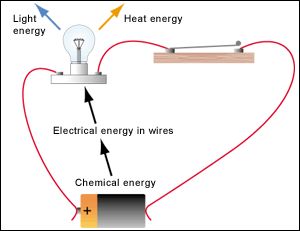CIE IGCSE Physics (0625) Electrical energy and electrical power Study Notes - New Syllabus
CIE IGCSE Physics (0625) Electrical energy and electrical power Study Notes
LEARNING OBJECTIVE
- Understanding the concepts of Electrical energy and electrical power
Key Concepts:
- Energy Transfer in Electric Circuits
- Electrical Power and Energy
- Definition of kilowatt-hour (kWh)
Energy Transfer in Electric Circuits
Energy Transfer in Electric Circuits:
Electric circuits are systems that transfer energy from a source (like a battery or mains supply) to various components.
- These components then convert electrical energy into other useful or wasteful forms, such as:
- Light (e.g. bulbs)
- Heat (e.g. heaters, resistors)
- Sound (e.g. buzzers)
- Movement (e.g. electric motors)
- Eventually, all this energy is transferred to the surroundings, mostly as thermal energy (heat).

Sources of Electrical Energy:
- Cells and batteries: Provide a constant direct current (d.c.) voltage.
- Mains electricity: Provides alternating current (a.c.) from power stations.
Energy Flow:
Source → Wires (carry current) → Components → Surroundings
Useful vs Waste Energy:
- Some energy is usefully transferred (e.g. light in a lamp).
- Some energy is wasted (usually as heat or sound).
Example:
A battery is connected to a filament bulb. Describe the energy transfers that take place in the circuit.
▶️ Answer/Explanation
Step 1: The battery stores chemical energy.
Step 2: When the circuit is closed, chemical energy is converted into electrical energy.
Step 3: The electrical energy is transferred to the bulb, where it is converted into:
- Light energy (useful)
- Thermal energy (wasted to surroundings)
Answer: \(\boxed{\text{Chemical} \rightarrow \text{Electrical} \rightarrow \text{Light + Heat}}\)
Electrical Power and Energy
Equations for Electrical Power and Energy:
Electrical Power: It is the rate at which electrical energy is transferred or used in a circuit.
- Formula: \( P = IV \)
- \( P \) = power in watts (W)
- \( I \) = current in amperes (A)
- \( V \) = potential difference (volts)
Electrical Energy Transferred: Total energy transferred by an electric device over time.
- Formula: \( E = IVt \)
- \( E \) = energy in joules (J)
- \( I \) = current in amperes (A)
- \( V \) = potential difference in volts (V)
- \( t \) = time in seconds (s)
Example:
A heater is connected to a 230 V mains supply and draws a current of 5 A. What is the electrical power of the heater?
▶️ Answer/Explanation
Use the formula \( P = IV \)
\( P = 5 \times 230 = 1150 \, \text{W} \)
Answer: \(\boxed{1150 \, \text{W}}\)
Example:
A bulb operates at 12 V and carries a current of 0.5 A for 4 minutes. Calculate the total electrical energy transferred.
▶️ Answer/Explanation
Convert time: \( 4 \, \text{min} = 240 \, \text{s} \)
Use the formula \( E = IVt \)
\( E = 0.5 \times 12 \times 240 = 1440 \, \text{J} \)
Answer: \(\boxed{1440 \, \text{J}}\)
Definition of kilowatt-hour (kWh)
Definition of kilowatt-hour (kWh):
1 kilowatt-hour is the amount of electrical energy used by a device rated at 1 kilowatt (kW) operating for 1 hour. It is a unit commonly used by electricity companies to measure energy consumption.
\( 1 \, \text{kWh} = 1 \, \text{kW} \times 1 \, \text{hour} = 1000 \, \text{W} \times 3600 \, \text{s} = 3.6 \times 10^6 \, \text{J} \)
Formula to calculate electrical energy in kWh:
\( \text{Energy (kWh)} = \text{Power (kW)} \times \text{Time (h)} \)
To calculate cost:
\( \text{Cost} = \text{Energy used (kWh)} \times \text{Cost per kWh} \)
Example:
A 2 kW heater is used for 3 hours. How many kilowatt-hours of energy does it use?
▶️ Answer/Explanation
Use \( \text{Energy} = \text{Power} \times \text{Time} \)
\( \text{Energy} = 2 \, \text{kW} \times 3 \, \text{h} = 6 \, \text{kWh} \)
Answer: \(\boxed{6 \, \text{kWh}}\)
Example:
An electric oven rated at 3 kW is used for 2 hours. If electricity costs ₹8 per kWh, what is the total cost of using the oven?
▶️ Answer/Explanation
First, calculate energy used:
\( \text{Energy} = 3 \, \text{kW} \times 2 \, \text{h} = 6 \, \text{kWh} \)
Now calculate cost:
\( \text{Cost} = 6 \, \text{kWh} \times ₹8/\text{kWh} = ₹48 \)
Answer: \(\boxed{₹48}\)
